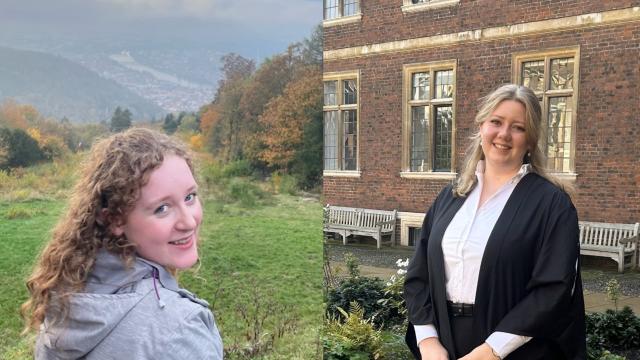
St Catharine’s and the Cambridge Institute for Medical Research (CIMR) were delighted to host a free four-day non-residential work experience programme on 15–18 February 2022 as part of a new University of Cambridge initiative to encourage more teenagers from diverse backgrounds to choose careers in STEM subjects.
Teenagers from state schools across Cambridgeshire spent three days of their February half-term break at the CIMR's world-class laboratories, preparing their own scientific presentation, developing new knowledge and practical skills, and learning first-hand how medical research can lead to new treatments.
Professor Stefan Marciniak (2011), Fellow of St Catharine’s and Professor of Respiratory Science at CIMR, commented:
“Both CIMR and St Catharine’s share the common goal of widening access to higher education in STEM. Several of the Institute’s PhD students are members of St Catharine’s – including Nikita Zubkov, Eimear Rutherford, Max Schwiening and Haoyang Ying in my own lab – and this presented an ideal opportunity to work together to offer an enriching experience over four days to help inspire the next generation of scientists and medics.
"For my part, I was really impressed by all the participating Year 12 students – I’m not sure I could have done half as well when I was 16 or 17 years old. Two of the sixth-formers assigned to my CIMR lab want to come back to work with us in the future, which means they must have felt at home. And so they should! They fit in perfectly and learned to do real cutting-edge science. It was a great reminder why access to research careers should be driven purely by ability and curiosity, not by background."
The fourth and final day was spent at St Catharine’s, where they learnt more about applying to Cambridge and similar universities, and discovered what life is really like for students at Cambridge – from current students like Megan Vickers, a second-year Natural Sciences undergraduate and one of the College's student ambassadors:
“I’m excited that CIMR and St Catharine’s are engaging local sixth-formers and wanted to offer my help to challenge myths and answer questions about life as an undergraduate. I hope the sixth-formers I met came away from the programme inspired to pursue careers in STEM subjects and confident that talented students from all backgrounds can thrive at Cambridge. As a working-class student, I was initially worried about whether I’d fit in here – when in reality everyone has been so friendly and I felt welcomed immediately.”
|
|
|
The partnership between St Catharine's and CIMR has been funded by the Cambridge Admissions Office Widening Participation Project (WPPF) fund, and was launched to help increase social mobility by supporting students who are curious about a career in science and research, but who may have reduced opportunities.
Jess Bartlet, Public Engagement Coordinator at CIMR, leading on organising the programme, explained:
“One of the most exciting aspects of the programme is that the students were helped to run their own experiments, and later give a scientific presentation. It’s about developing specific skills that they can take with them to university, but it’s also about offering them an idea of what it’s like to work on the cutting edge of science, how creative research can be, and how important it is to ‘think outside the box’. It’s been developed with increasing Science Capital in mind.”
Professor Julian Rayner, Director of the CIMR, said:
“The pandemic response has shown the incredible power of medical research, with new diagnostics, treatments and vaccines for SARS-CoV2 in use by billions less than two years after the virus was first discovered. Research depends on great ideas, so it’s critical that we make it open to everyone. I’m delighted that Cambridge and CIMR have developed this programme, to offer students from diverse backgrounds an opportunity to work with world-leading scientists and create connections with the University. We hope it had a real impact and inspire them to pursue careers in STEM.”





